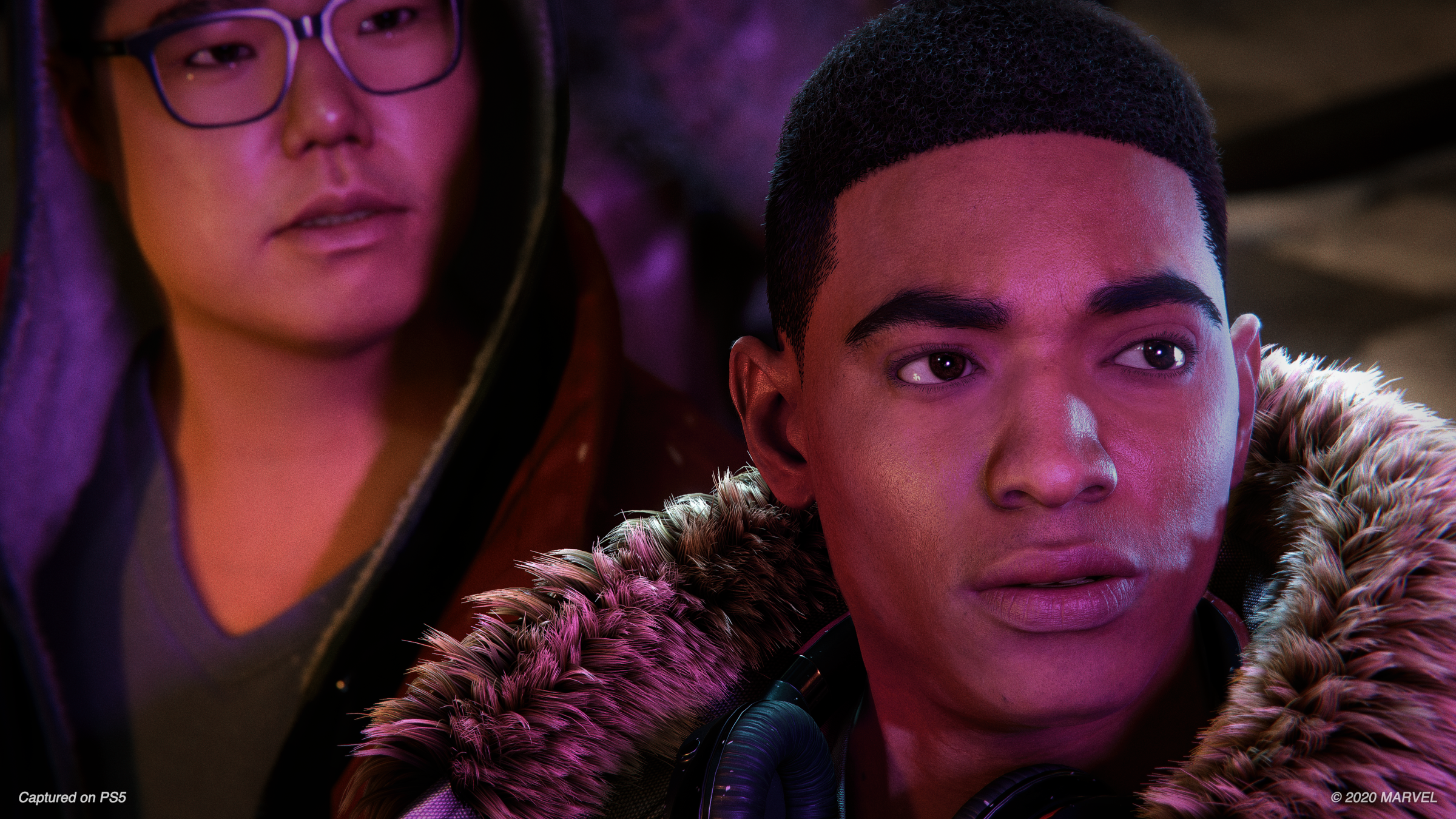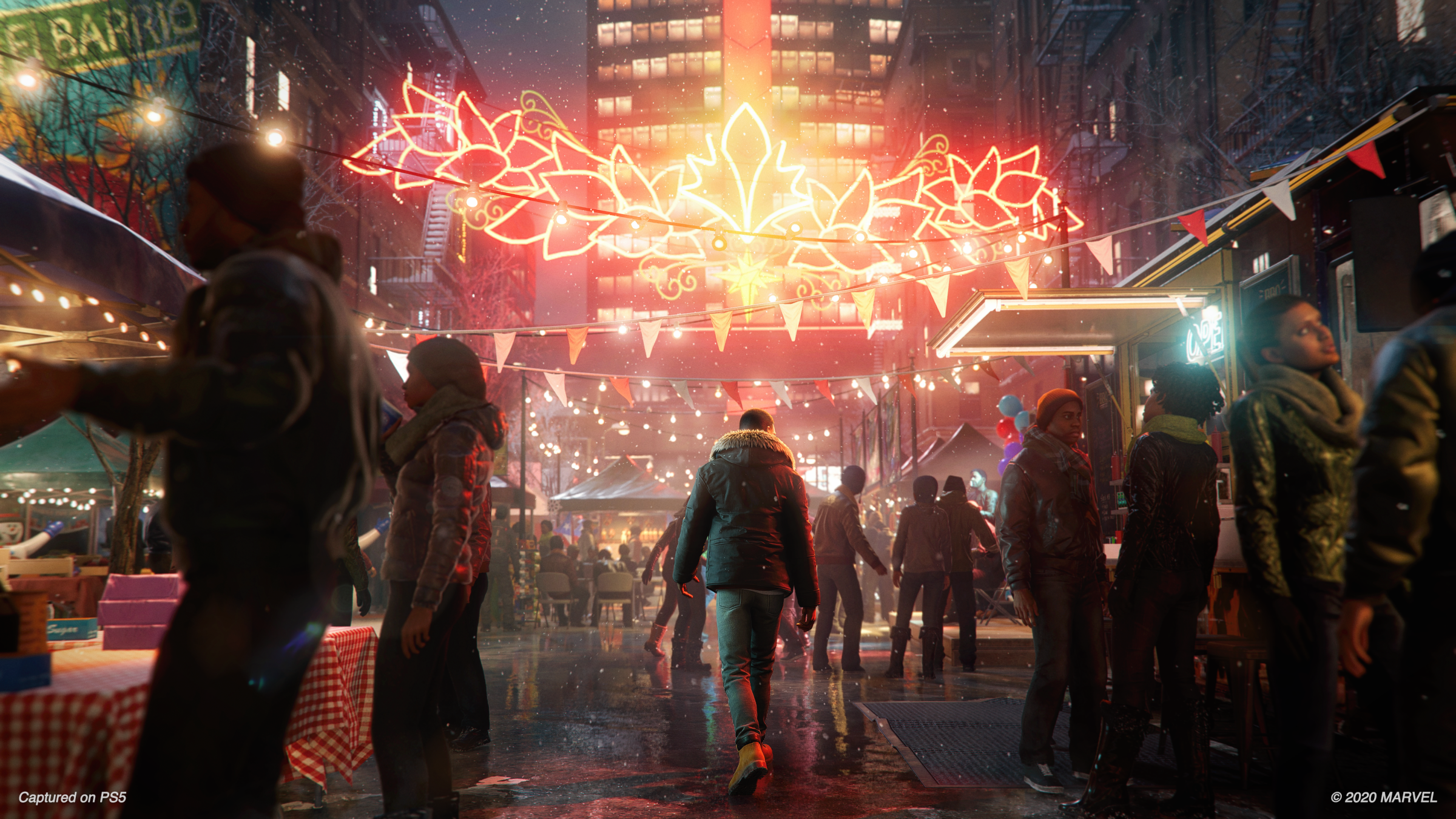There was plenty to love about Marvel and Insomniac’s 2018 Spider-Man video game, from the mechanics of swinging through a hyper-realistic Manhattan to the story’s emotional gut-punches. But many critics had one major issue with the plot: Peter Parker’s fantasies about an alter-ego he dubbed “Spider-Cop,” a hard-boiled detective who had all the problematic markings of a Law & Order-style TV crime-fighter who refuses to play by the rules no matter the consequences.
The “Spider-Cop” storyline was cringe-worthy in 2018, five years after the Black Lives Matter movement began to coalesce. It has aged even worse in the past year, as fresh protests against police brutality have erupted across the world. This year’s follow-up game, Spider-Man: Miles Morales, whose hero is a Black-Puerto Rican teen, offered Insomniac an opportunity to address these criticisms. But while the game is a joy to play—with a wonderful cast of characters and a new set of thrilling Spidey powers—it also bends over backwards to avoid any nuanced conversation about criminal justice. In fact, the police have largely been removed from the game, skirting the issue entirely.
That’s a shame, because the game—a hotly-anticipated title that millions are likely to play—is uniquely positioned to respond to our current moment. Miles, who features in his own comics series and was the hero of 2018’s Oscar-winning film, Spider-Man: Into the Spider-Verse, is a native of New York City, where tensions between the police and communities of color have been escalating for years. Miles’ father also happened to be a cop killed during a terrorist attack in the 2018 game. At the beginning of this new game, Peter takes a well-earned vacation and leaves his protege, Miles, to protect New York on his own. The veteran Spidey’s only been gone a few hours when an evil corporation called Roxxon, run by an Elon Musk-type, threatens Miles’ diverse Harlem neighborhood.
Given his lived experience and his father’s job, Miles may have complicated feelings about law enforcement and criminal justice—feelings that could have evolved over the course of this game’s storyline in interesting, thought-provoking ways. Sadly, Insomniac balks at the chance to render the full complexity of Miles’ story.
Video games differ from movies, television and books because they quite literally put the player in the protagonist’s shoes. As a player, you’re not just identifying with a character, you’re inhabiting them—controlling their movements and their choices, at least as much as a given game allows. In theory, games have the opportunity to build a level of empathy between player and character that other forms of entertainment do not. Into the Spider-Verse touted that anyone could wear the mask; Spider-Man: Miles Morales offers that opportunity to anyone with a PlayStation. For video games to live up to this opportunity, it’s vital that they invite players to experience the lives of people who do not look like them or come from the same background. But game creators must also be willing to ask players to confront the uncomfortable and unpleasant aspects of characters’ lived experiences.

To its credit, Insomniac did realize that Miles can’t have the same relationship with the police as Parker, a white man. So instead of getting tips from cops, Miles’ friend designs an app that allows distressed New Yorkers to report crimes directly to Spider-Man. This facilitates more intimate interactions between Miles and the people he protects. Like Peter in the 2018 game, he doesn’t just drop-kick evil scientists—he also finds lost cats and fixes busted pipes at the neighborhood homeless shelter. Both Miles and Peter protect their communities through more quotidian tasks like volunteering their time and energy to feed and shelter those in need. These are fictional but compelling examples of how community service could foster a more trusting relationship between communities and crime-fighters than many current police tactics.
But why Miles would rather avoid the police—or why Harlem residents might turn to him rather than the cops—is never stated outright, and players might have different expectations for how the game ought to handle unspoken moments of tension. A Black player who has grown up approaching police with caution because of racism in our criminal justice system might immediately understand what’s going on, whereas a white player might need these more subtle plot points spelled out for them because they’ve have had a radically different experience with the police.
In another big departure from the Peter Parker game, the police never speak to Miles’ Spider-Man when they see him on the street. And in situations where you might expect to see police—running security at a political event, for instance—instead there’s Roxxon’s private security force. (Why Roxxon would employ thousands of soldiers in futuristic combat gear, and why the City of New York would allow this heavily armed privatized army to wander freely around Manhattan, is never explained.)
The game does hint at the unexplained tensions between Miles and the police. When he defeats a group of henchmen, for example, he will often insist on a quick getaway, because the cops “aren’t big Spider-Man fans.” This wasn’t true of Peter in the previous game, who often teamed up with the chief of police to fight crime and even helped her to set up a citywide surveillance system. Toward the end of Miles Morales, I started to stick around longer after webbing up a few dozen evil-doers for the police to arrest, just to see how the police would react to Miles when they arrived. But the cops rarely showed up, and the few times they did, it was impossible for Miles to interact with them. (By contrast, Peter often would shoot the breeze with the police in the 2018 game.)
The absence of cops leaves efforts to allude to Black Lives Matter feeling like empty gestures at best. Early in the game, Miles saves an entire crowd of people. But rather than greeting him as a hero, Roxxon’s masked security forces turn their guns on him, aiming to kill. Miles raises his hands in the air, signaling not to shoot. People in the crowd call out that Spider-Man is a good guy. Some pull out their phones to record a potential homicide. This cutscene is the game’s most blatant nod to the countless, tragic viral videos of real-world police shooting, and often killing, unarmed Black people. But replacing real, identifiable policemen and women with faceless corporate henchmen zaps the moment of most of its power; the player is never forced to consider the men behind the masks who decided to try to kill a kid.
Another side mission leads Miles to a Black Lives Matter mural. The moment is a powerful statement outside the game’s universe, but a puzzling one within it. It’s the first time the Black Lives Matter movement is mentioned. I couldn’t help but wish for a flashback scene in which Miles and his father discuss how they feel about racism in policing.

If Miles Morales fails to make a big statement about law enforcement, it at least has something to say about marginalized communities. At one point in the game, Miles observes that Roxxon is trying to take advantage of Harlem because the city doesn’t care what happens to people who live there—he believes he’s the only one willing to protect his home, as do Harlem’s citizens, who call Miles “our Spider-Man.”
Meanwhile, Miles’ mother, Rio Morales, runs for political office on the promise to oust Roxxon, which has built an experimental power plant in Harlem, from the neighborhood. Her argument echoes Alexandra Ocasio-Cortez’s real-world protest against Amazon’s plans to build a headquarters in Queens. But while Ocasio-Cortez pointed to local and state leaders as the institutional forces incentivizing Amazon’s arrival, Insomniac’s game fails to explore what role the government played in Roxxon’s decision to set up shop in Harlem. Ultimately, the game suggests the threats to Harlem are fantastical—Morales just has to stop one maniacal wacko to save the neighborhood. But the story ignores the real threats to Miles’ community, like gentrification and institutional racism. (The game’s Harlem feels about two decades older than the real deal, where yoga studios and multi-million-dollar high-rises are supplanting long-standing Black businesses and cultural institutions.)
Yet Miles Morales is so thoughtfully and meticulously constructed in other ways. Miles’ family and friends reflect the actual diversity of New York City. He and his mother switch seamlessly between Spanish and English in conversation. He’s also fluent in ASL, and establishes a flirtation with a deaf street artist. These quietly revolutionary aspects of the game make Miles’ New York richer and more real than Peter’s version ever was.
There are smaller thrills, too. If you complete a particular mission, you earn a special feline sidekick whose flurry of fighting tactics made me giggle with glee. The game is set at Christmastime, and after a certain point, you can swing through the city wearing earmuffs, a scarf and a hat atop the Spidey suit to keep warm. And anyone who lives in New York will discover a renewed sense of joy exploring a city that has been in various states of lockdown since the coronavirus forced major shutdowns earlier this year. Toward the end of the game, I crawled my way to the top of the Empire State Building and found myself in tears gazing over the gorgeously rendered and shockingly accurate depictions of neighborhoods I haven’t been able to safely visit in months.
Still, I wish Miles Morales’ creators had spent as much time thinking about how to reckon with racism in policing as they did perfecting their virtual Manhattan. They built a realistic city and community. The next step should have been realistically depicting Miles’ specific point of view on the most urgent matters of the day. Miles’ specific backstory as the Black Puerto Rican son of a cop sorting through what it means to protect a community as a superhero—including when to help the police and when to fight them—connects to one of the most rich and promising topics being explored in recent superhero comics, movies and TV shows. Let’s hope the next entry in the Spider-Man video game series does that subject matter justice, too.
More Must-Reads From TIME
- The 100 Most Influential People of 2024
- The Revolution of Yulia Navalnaya
- 6 Compliments That Land Every Time
- What's the Deal With the Bitcoin Halving?
- If You're Dating Right Now , You're Brave: Column
- The AI That Could Heal a Divided Internet
- Fallout Is a Brilliant Model for the Future of Video Game Adaptations
- Want Weekly Recs on What to Watch, Read, and More? Sign Up for Worth Your Time
Write to Eliana Dockterman at eliana.dockterman@time.com